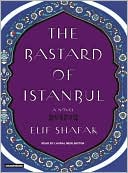

 |

|

The average rating for The Bastard of Istanbul based on 2 reviews is 3.5 stars.
Review # 1 was written on 2008-03-29 00:00:00 Brian Jarrett Brian JarrettIt was the cover that snared me. Turkey is one of the top three countries on my mental list of countries to visit, along with the Czech Republic and Morocco, and I love Turkish architecture and design. The cover reminded me of those beautiful mosaics and arches and mosques, and then the title! Who could resist? A less impulsive person than me, sure, but this is my idea of living dangerously :) Beautifully, gracefully, vividly written with a light, airy atmosphere that really allows you to breathe, The Bastard of Istanbul follows the story of two girls and their families, one Turkish, one Armenian American, and how their histories interweave. Asya Kazanci is the bastard daughter of Zeliha, raised by an eccentric group of aunts and grandmothers in Istanbul. Now 19, she spends most of her time listening to Johnny Cash records and philosophising with a group of older, cynical political outcasts at the Cafe Kundera. In Arizona, 19 year old Armanoush "Amy" Tchakhmakhchian bounces between her over-protective American mother Rose and quiet Turkish step-father Mustafa, and her father Barsham's large Armenian family in San Francisco. Struggling to understand herself and what it means to be Armenian, she decides to journey to Turkey and stay with her step-father's family, the Kazanci's. Politics, history, philosophy, religion, and the familiar struggle for personal identity in relation to and against a collective group flesh out this lovely tale, littered with references to popular culture and classic literature. Likened to the work of Amy Tan, Shafak's prose is much more philosophical and lyrical, and her themes are less dramatic for drama's sake. I found all her characters to be instantly recognisable, and I felt that both Asya and Amy to be familiar, and similar, to myself in some ways. I identified with them far more readily than I would reading about a more conventional teenager. The atmosphere is wonderful, from dry Arizona to misty San Francisco to loud, colourful, vibrant Istanbul - made me want to go there even more than before! I could hear and smell and see it all so clearly, though the prose is not overly descriptive. With an omniscient narrator who reveals the inner tortures and idiosyncracies of the characters with a humorous but sympathetic touch, the narrative goes back and forth in time, skilfully revealing the past as it corresponds to the present, creating a tapestry as detailed and vivid as a Turkish carpet. I loved all the aunts too, with their quirks and Banu's djinni. Yes, there's a touch of magic realism in this book that serves it well. The conflict between Turks and Armenians, the denial of the Armenian genocide which, I believe, is still keeping Turkey out of the EU, is dealt with with a great deal of compassion and understanding. Shafak makes an effort to show different arguments, as in, why the Turks are so ignorant of this history and why the Armenians are so stubborn to relive it. There was a wonderful quote about that but sadly I didn't mark the page and now I can't find it. This was a random find in the bookshop and an absolute gem to read, and I highly recommend it. On a side note, the author mentions that the book was first released in Turkey in 2006 (she wrote it in both Turkish and English) and she was facing up to three years in jail because some of the things the Turkish characters said went against the nation, something like that, but the charges were dropped. Still, it's a bit scary, but also fascinating - Turkey is arguably one of the more liberal Muslim states, by western standards, where women have rights and opportunities, but where conservative traditions still play a heavy hand in domestic affairs. |
Review # 2 was written on 2007-09-04 00:00:00 Max Owen Max OwenThe book suffers due to its trite language, stereotypical characterization, and unsubtle plot. You end up not really caring for any of the characters, and wishing that the two deep questions - the Armenian genocide and the Turkish identity pre and post Ataturk, had been painted on a more deserving canvas... |
CAN'T FIND WHAT YOU'RE LOOKING FOR? CLICK HERE!!!